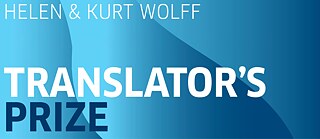25 Years Wolff Prize
COMMEMORATING THE 25TH ANNIVERSARY OF THE HELEN & KURT WOLFF TRANSLATOR'S PRIZE

Shelley Frisch, jury chair of the Helen & Kurt Wolff Translator’s Prize, reflects on the twenty-five year history of the prize, its significance to literature in translation, and its role in honoring the Wolff family’s extraordinary legacy in publishing.
By Shelley Frisch
On this auspicious occasion, the twenty-fifth anniversary of the Helen and Kurt Wolff Translator’s Prize, it is my honor to provide brief reflections on the prize’s significance for translators, translated literature, and the promotion of German-language literature-in-translation in North America. I have served on the Wolff jury since 2015 and as jury chair since 2016.
What makes this prize unique? It is the only prize awarded expressly and exclusively to English-language translations of German texts that have been published in the United States or Canada. And unlike translation prizes that accept submissions from a variety of source languages and judge the merits of the translations on the basis of how well the translation reads, the Wolff jurors go back to the German originals to trace the evolution of the new text, homing in on the challenges the source texts pose and following how the translated text accomplishes its transformation into English. We look carefully—and, so often, awestruck—at the inspired and ingenious choices made in turns of phrase, register, rhythm, and tone that enable the finest translations to take wing.
Since the inception of this prize in 1996, its seat has shifted both geographically—from its original home in Chicago to New York in 2015—and compositionally. The jury is composed of translators and literary critics. The early juries typically comprised four men and one woman, but the balance shifted over the years, and since 2012, each year’s prize has been judged by three women and two men. A plenary in-person meeting follows, close to the time of the ceremony. Like so much else in this pandemic year, the full jury meeting will need to take place remotely this spring.
Helen and Kurt Wolff [...] did so much to awaken interest in and nurture foreign literature in the United States ...
The field of translation has been blossoming in recent years, with new translation studies degrees, certificate programs, and increased translator visibility as evidenced by translators’ names appearing on book covers and in promotional materials and book reviews, and by translators participating more actively in book launches and panel discussions. Helen and Kurt Wolff, who did so much to awaken interest in and nurture foreign literature in the United States, would have been pleased by these developments, and this translator’s prize, established in their names and administered by the Goethe-Institut, has done a great service in bringing together the translation community, spreading the word about outstanding works in German, and shining a light on translation and translators. The ceremony itself gathers together the jury, the editor of the winning text, the Goethe-Institut staff, representatives of other German cultural institutions, members of the media, and an appreciative public to join in the celebration of the prizewinning translator and text, with fine food and music enhancing the pleasure of the evening. There is always that moment of levity after the various laudations when the awardee is presented with a massive bouquet of flowers just before delivering remarks to the audience, then scrambles to find some way to give it right back so as to have hands free to grasp the podium and/or a prepared manuscript.
I’d like to conclude with a personal expression of gratitude to Helen and Kurt Wolff and their family. I met Helen Wolff in person many years ago at her New York office and retain fond memories of our extended conversation about publishing and translation. As for Kurt Wolff, he plays an outsized role, as Kafka’s publisher, in Reiner Stach’s three-volume Kafka biography, which I translated into English and for which I accepted this prize in 2014. Kafka was a reluctant submitter of texts, writing to Kurt Wolff after their first meeting, "I will always be grateful to you more for the return of a manuscript than for its publication." Wolff nonetheless managed on occasion to pry texts out of Kafka’s unwilling hands and publish as many as he could. Now his grandson, Alexander Wolff, has published Endpapers, a riveting account of the Wolff family history. His acknowledgments page is a warm tribute to the work of translators, and specifically to those who have won the Wolff prize. Alexander writes, "The bibliography [of Endpapers] name-checks no fewer than eight winners of the Helen and Kurt Wolff Translator’s Prize … herzlichen Dank and huge thanks for all that they’ve done or do."
Kurt Wolff wrote to Karl Kraus in 1913: "I consider a publisher to be … a kind of seismographer, whose task it is to keep an accurate record of earthquakes. I try to take note of what the times bring forth in the way of expression [and] place it before the public." Our jury for the prize bearing the Wolffs’ name, indebted as ever to the strides Helen and Kurt Wolff made in fostering international literature, aims to carry on this seismographic task of bringing groundbreaking translation work by outstanding wordsmiths to the attention of the reading public at large.
>>Back